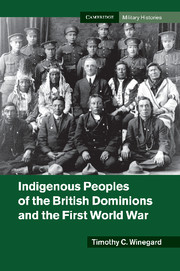Book contents
- Frontmatter
- Contents
- Figures
- Maps
- Tables
- Acknowledgements
- Note on the text
- Introduction
- 1 Colonization and the settler state
- 2 Racial constructs and martial theories
- 3 Precedents of military pragmatism
- 4 Dominion defence acts
- 5 1914: Subjugated spectators
- 6 1915–1916: King and country call
- 7 1917–1918: All the King’s men
- 8 Indigenous soldiers
- 9 The home front
- 10 Peace with prejudice
- Conclusion
- Bibliography
- Index
- References
6 - 1915–1916: King and country call
Published online by Cambridge University Press: 05 June 2014
- Frontmatter
- Contents
- Figures
- Maps
- Tables
- Acknowledgements
- Note on the text
- Introduction
- 1 Colonization and the settler state
- 2 Racial constructs and martial theories
- 3 Precedents of military pragmatism
- 4 Dominion defence acts
- 5 1914: Subjugated spectators
- 6 1915–1916: King and country call
- 7 1917–1918: All the King’s men
- 8 Indigenous soldiers
- 9 The home front
- 10 Peace with prejudice
- Conclusion
- Bibliography
- Index
- References
Summary
By the close of 1914, the 125,000 ‘old contemptibles’ of the BEF had suffered 90,000 casualties. Although the Dominions mobilized expeditionary forces and conducted training both at home and abroad, no Dominion forces participated in major campaigns during 1914. During 1915 and 1916, Dominion forces expanded and became key components of the fighting strength of the BEF on the Western Front and at Gallipoli. High casualty rates accompanied this participation, and the swelling expeditionary forces required increasing reinforcements to sustain these national formations. The escalating overall strength of Allied armies was accompanied by the immediate need for service and support auxiliaries, such as labour battalions, forestry corps and pioneer battalions. Britain increasingly looked to her Dominions as a source of men and materials. Amplified Dominion participation, however, was accompanied by greater demands for inclusion in strategic and operational counsel by Dominion prime ministers to satisfy nascent domestic national consciousness.
Within this general atmosphere, in October 1915, the War Office issued the three most important imperial documents of the war pertaining to indigenes of all Dominions. Inclusion of indigenes in Dominion forces and the alteration of Dominion policies between 1915 and 1917 were directly allied to these requests of the imperial government. While scholars of individual nations have noted the drastic shift in specific Dominion policy towards greater inclusion after October 1915, not one has referenced these documents, or offered a comparative explanation for the collective shift towards the inclusion and recruitment of indigenes for expeditionary forces. The level of inclusion varied within the Dominions and was based on pragmatic requirements, domestic attitudes and contemporary racial philosophies and anxieties. These decrees also affected the formation and deployment of indigenous expeditionary forces from other British colonies and protectorates, and the inclusion of other minorities in Dominion formations. Moreover, these British decisions directly influenced France to alter policy and practice concerning the recruitment and tenure of colonial soldiers.
- Type
- Chapter
- Information
- Publisher: Cambridge University PressPrint publication year: 2011



